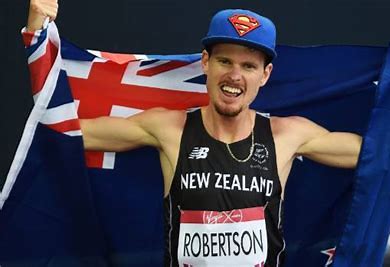The sanction means that Robertson, who retired in February, cannot compete again until September 2030.
New Zealand Athlete Zane Robertson Handed Eight-Year Ban for Doping Violations


New Zealand Olympic distance runner Zane Robertson has been given an eight-year ban after failing a drug test and tampering with the doping control process, the country’s Sports Tribunal announced Wednesday.
Robertson, who has competed in the past two Olympics and won a bronze medal at the 2014 Commonwealth Games, tested positive for erythropoietin – commonly known as EPO – at a race in Manchester, England, last May.
EPO is a hormone naturally produced in the kidneys that controls the formation of red blood cells. When administered to athletes, it can increase the amount of oxygen delivered to muscles, improving recovery and endurance.
The 33-year-old received a four-year ban for the positive test and a further four-year ban after the sports tribunal ruled that he had “sought to subvert the doping control process.”
He, however, tried to escape censure by claiming as part of his defence that the banned drug had only gotten into his body after he visited a Kenyan medical facility to get a Covid-19 vaccine – only to be treated for Covid-19 instead, which he claimed involved the administration of EPO.
Robertson, who holds the New Zealand national record at the half marathon (59min 47secs) and marathon (2:08:19), also claimed that he had told the doctor that he was an athlete who could not be given anything on the prohibited list.
He supported his claims with sworn affidavits from two Kenyan doctors, hospital notes, a hospital report, and a witness statement from a Kenyan detective, arguing that there was “no fault or negligence” on his part.
Robertson’s case, however, began to unravel when the Kenyan medical facility’s vice-president told anti-doping investigators that the runner was not administered EPO at the facility, that he had not attended the facility on the alleged date, and that the medical notes submitted were not generated at the facility.
The vice-president also said, of the two doctors Robertson had said treated him, one was a lab technician and the other was not employed at the facility.
“In light of the additional evidence collected and filed by Drug Free Sport New Zealand, Mr Robertson has chosen not to rely on the evidence he originally filed and no longer seeks to contest the sanction for the anti-doping rule violations,” the 14-page report into his case stated.
The sanction means that Robertson, who retired in February, cannot compete again until September 2030.
“Doping denies clean athletes the chance to excel on a level playing field,” said DFSNZ chief executive Nick Paterson. “Mr Robertson’s actions are not just deeply disappointing, but undermine the high levels of sporting integrity we see and expect from athletes who represent our country.”

 বাংলা
বাংলা  Spanish
Spanish  Arabic
Arabic  French
French  Chinese
Chinese 
